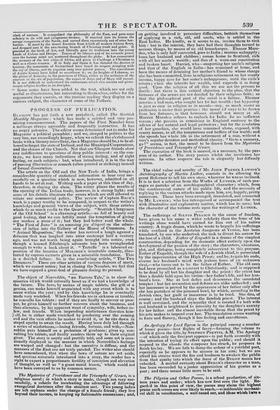The Mysteries of Providence and the Triumphs of Grace, is
a religious novel ; in which a story is made, though not very suc- cessfully, a vehicle for inculcating the advantage of following evangelical doctrines after the straitest sect. Two young ladies are left orphans under the charge of a female friend; they live beyond their income, in keeping up fashionable connexions; and, on getting involved in pecuniary difficulties, bethink themselves of applying to a rich, old, odd uncle, who is settled in the East Indies. He kindly, as it seems to us, invites them to visit him : but in the interim, they have had their thoughts turned to serious things, by means of an old housekeeper. Eleanor Mars- den, who is only half converted, goes to India ; marries unhappily ; loses her husband and children ; comes home to Scotland, rich with all her uncle's wealth; and dies of a worn-out constitution and broken heart. Harriet, who—suspecting her uncle's religion and that of the English in India—has remained at home, and been the means of detaining her mother's friend to whose charge she has been committed, lives in religious retirement on her scanty income, happy save for her sister's unhappiness, until the exile's return; when she inherits her wealth, and expends it in doing good. Upon the religion of all this we are not the persons to decide : but there is this critical objection to the plan, that the fortunes of the actors are not decided by their religious faith ; so that the philosophical part of the novel is a failure. Eleanor marries a bad man, who sought her for her wealth : but hypocrisy is just as easy in religion as in morals—nay, as much easier as profession is easier than practice : the moral (if any) to be drawn from her fortune, is that heiresses should not marry at alt. Harriet Marsden refuses to embark for India for no sufficient reason ; she persists in remaining in England contrary to the advice of her natural and legal protectors ; but for the resolution of her guardian, she would have remained alone, exposed, with scanty means, to all the temptations and buffets of the world: and she spends her whole life in the retirement of a nun, without a nun's regular devotion and methodical charity. "Go to a nunnery, go !" seems, in fact, the moral to be drawn from the Mysteries of Providence and Triumphs of Grace.
The execution of the book is marred, in a measure, by the pur- pose of its author. The story pauses whilst she inculcates her opinions. In other respects the tale is elegantly but diffusely written.


























 Previous page
Previous page